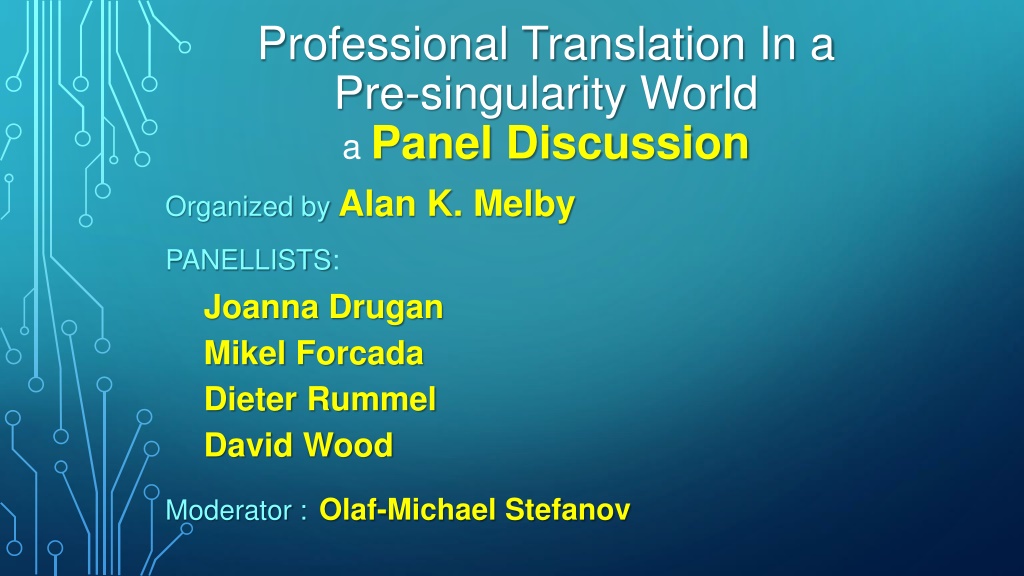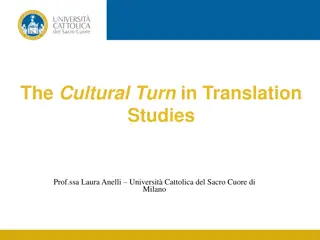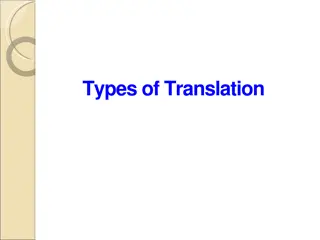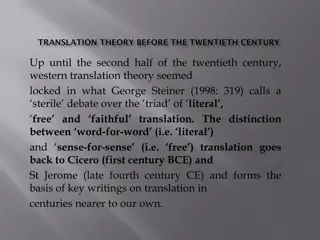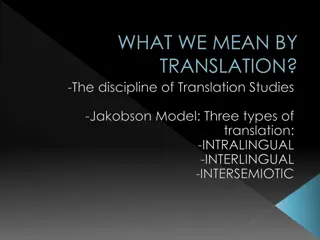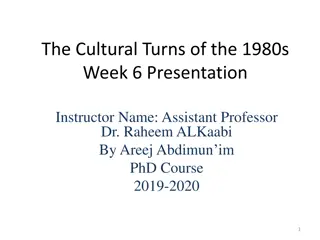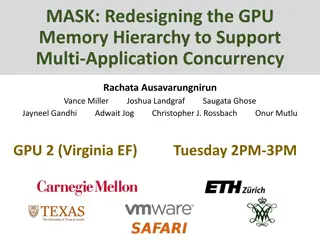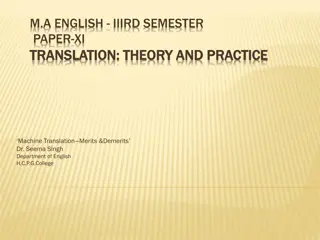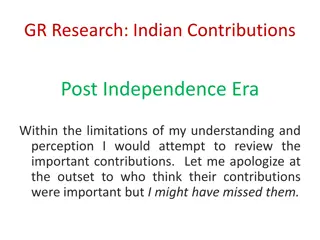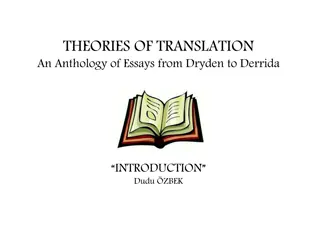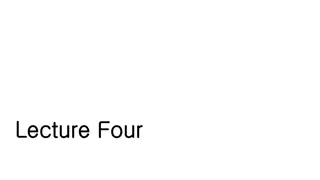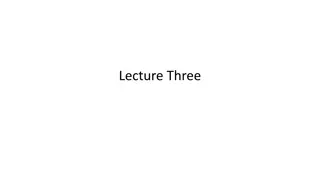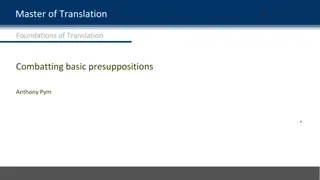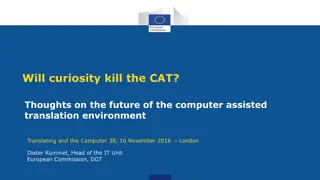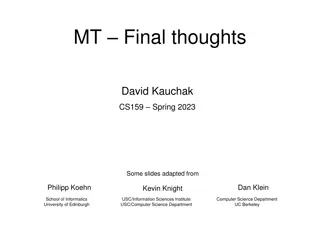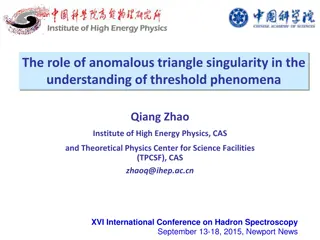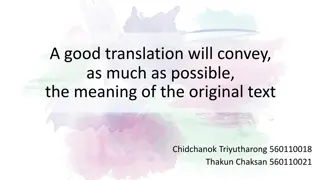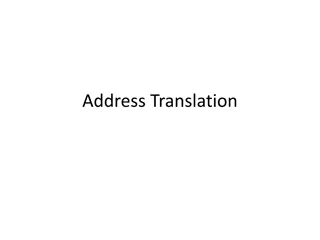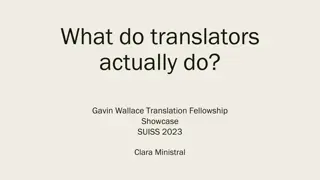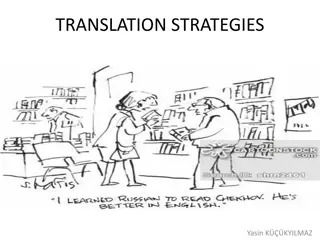Professional Translation in Pre-Singularity World Panel Discussion
Explore the future of professional translation in a pre-singularity world through insights from experts like Joanna Drugan, Mikel Forcada, Dieter Rummel, and David Wood, moderated by Olaf-Michael Stefanov. Organized by Alan K. Melby.
Download Presentation

Please find below an Image/Link to download the presentation.
The content on the website is provided AS IS for your information and personal use only. It may not be sold, licensed, or shared on other websites without obtaining consent from the author. Download presentation by click this link. If you encounter any issues during the download, it is possible that the publisher has removed the file from their server.
E N D
Presentation Transcript
Professional Translation In a Pre-singularity World a Panel Discussion Organized by Alan K. Melby PANELLISTS: Joanna Drugan Mikel Forcada Dieter Rummel David Wood Moderator : Olaf-Michael Stefanov
Professional Translation In a Pre-singularity World Panel Composition The objective: include someone from each of the following communities: - The singularity community (someone who firmly believe in Kurzweil's vision of the future) - The machine translation developer community - The translation industry (doing / managing translation projects) - The academic community educating translators - The professional translator community
Professional Translation In a Pre-singularity World Panel Composition - For the singularity community: David Wood - For the machine translation developer community: Mikel Forcada - For the translation industry: Dieter Rummel - For the academic community educating translators: Joanna Drugan - For the professional translator community: Alan Melby
Professional Translation In a Pre-singularity World Panel Composition Organized by Alan K. Melby, Professor Emeritus of Linguistics, Brigham Young University; Council Member, International Federation Of Translators (FIT); Certified French- to-English Translator; President of LTAC Global, A Small Non-profit. PANELLISTS: Joanna Drugan, Senior Lecturer in Applied Translation Studies, and Director of Graduate Studies, University of East Anglia (UEA), UK Mikel Forcada, Professor of Computer Languages and Systems at the Universitat d Alacant (ES), President of the European Association for Machine Translation (EAMT) Dieter Rummel, Head of the Informatics Unit, European Commission (EC), Directorate- General for Translation (DGT) David Wood, Co-founder of Symbian (1998), one of the pioneers of the smartphone industry. As chair of London Futurists he has organised over 150 meetups since 2008 on topics such as the singularity, transhumanism, technoprogressivism, and the abolition of aging. He is an independent futurist, consultant, writer, and keynote speaker.
Professional Translation In a Pre-singularity World Panellists Dr Joanna Drugan Senior Lecturer in Applied Translation Studies, University East Anglia (UEA), UK main research interests: translation quality, translation ethics and translation technologies most recent book: Quality in Professional Translation (Bloomsbury, 2013) currently researching real-world ethical challenges when professional translators and interpreters are not available, particularly in healthcare and social work, and ways in which policy, training and technology might support professionals and service users faced with such challenges: Translation and Transnational Organised Crime (http://www.paccsresearch.org.uk/transnational-organised-crime-and-translation/)
Professional Translation In a Pre-singularity World Panellists Mikel Forcada Professor of Computer Languages and Systems at the Universitat d'Alacant President of the European Association for Machine Translation (EAMT) book review editor of the international journal Machine Translation founder and president of the project management committee of the free/open-source machine translation platform Apertium Co-founder and chief research officer of language technology company Prompsit Language Engineering
Professional Translation In a Pre-singularity World Panellists Alan Melby Professor Emeritus of Linguistics, Brigham Young University, Provo, Utah, USA Council Member of the International Federation of Translators (FIT) Certified French-to-English Translator, President of LTAC Global, A Small Non-profit. Alan Melby worked on a machine translation project for a decade before switching his focus to tools for human translators. Co-editor of the first version of TMX; involved in the development of TBX and the ASTM International standard for translation
Professional Translation In a Pre-singularity World Panellists Dieter Rummel Head, IT Unit, European Commission (EC), Directorate General for Translation started his career in the development team for the European Commission s Euramis (European multilingual information system) project in 1995. The project implemented i.a. a large scale translation memory database that is still used today by translators in the language services of the EU. In 2000 Dieter joined the Translation Centre for the Bodies of the EU (CdT), an EU Agency that provides translation services to other decentralised EU agencies. Here Dieter was initially responsible for language technology before he headed the Translation Support Department that provides technical, linguistic and organizational services to the Centre s translators. At CdT Dieter got involved in the interinstitutional cooperation between the language services of the EU that tries to identify synergies and cost savings by sharing working methods and IT tools. His most important contribution in this context was the management the IATE project for the creation of a single, interinstitutional terminology database. IATE has been used as a common platform for collaborative terminology work by EU terminologists since 2004. Its public site iate.europa.eu was launched 2007. In 2014 Dieter returned to the EC as Head of the Informatics Unit in the Directorate General for Translation (DGT). His unit develops and maintains workflow and language applications for translators, support colleagues and managers of DGT. A number of language applications are shared with other EU language services in the framework of interinstitutional cooperation. Hot topics for the IT unit in DGT are currently machine translation and defining a flexible and sustainable computer assisted translation environment.
Professional Translation In a Pre-singularity World Panellists David Wood Co-founder of Symbian (1998), One of the pioneers of the smartphone industry. Chair of London Futurists - has organised over 150 meetups since 2008 on topics such as: the Singularity, transhumanism, technoprogressivism, and the abolition of aging. He is an independent futurist consultant, writer, and keynote speaker.
Professional Translation in a Pre-Singularity World All panellists, as a pre-condition, agree to use the following definition of the Singularity proposed by Ray Kurzweil on his website (http://www.singularity.com/qanda.html): So what is the Singularity? non-biological intelligence will match the range and subtlety of human intelligence.. It will then soar past it because of the continuing acceleration of information-based technologies, as well as the ability of machines to instantly share their knowledge. [ A Singularity Entity ] will have access to its own design and will be able to improve itself in an increasingly rapid redesign cycle.
Professional Translation in a Pre-Singularity World Therefore, by definition, if the Singularity event arrives, machines will be better than humans at every intellectual task, and all human translators (and other professionals) will then be subject to replacement by highly intelligent machines, which we will call Singularity Entities. This panel is not about whether the Singularity will arrive in this century, or ever, but rather about professional translators in a pre-Singularity world. This will allow believers and non-believers in the Singularity to discuss translation together in a constructive fashion.
Professional Translation in a Pre-Singularity World The question for the panel: whether (in our pre-Singularity world) raw, i.e., unedited, machine translation (MT) will be able to handle all types of translation tasks. Right now, it is satisfactory for only a few types. As it improves, what types of translation will still need professional human translators?
Professional Translation in a Pre-Singularity World To make the discussion as concrete as feasible, translation tasks will be described through structured translation specifications, based on the translation parameters found in section 8 of the ASTM translation standard and available at http://www.tranquality.info/specs/ . In the 2014 version of the ASTM translation standard, parameters are grouped by product (i.e. what kind of work product is required, process, and other (e.g. deadline)
Professional Translation in a Pre-Singularity World It is well known that machine translation does better with some language combinations than others. But often left out of discussions comparing human and machine translation are 2 other factors taken into account in the ASTM standard: the wide variety of types of source content and the huge differences in translation requirements for translation activities.
Professional Translation in a Pre-Singularity World Translating a piece of legislation that must for years to come have equal force in courts in source and target-language versions is very different from translating a tech support article that might become obsolete within a few days and is designed to reduce but not eliminate support calls and thus need not be perfectly accurate or readable. Legal translation is one example of high-end translation, as is translation for marketing purposes. Translation of marketing materials intended to generate sales (an example of what is sometimes called transcreation ) is very different from localization of an online transaction system between mutually familiar commercial partners that will not be used by the public.
Professional Translation in a Pre-Singularity World If a panelist answers "yes" (all translators will be replaced before the Singularity) then s/he will be expected to explain why all types of translation requirements can be met by machines that lack the intellectual power of a Singularity Entity. If a panelist answers "no" (translators will not all be replaced before the Singularity) then s/he will be expected to point out types of translation requirements that will still require the services of professional human translators. The panel will last 2 hours and consist of 3 phases: 1. Each panelist will have 5-8 minutes to establish his or her position (40 minutes); 2. The panelists will debate among themselves and take questions from and respond to the audience for about 50 minutes; 3. Each panelist will have 3-4 minutes to sum up her or his position towards the end (20 minutes) The other 10 minutes will be required to open and close the panel, and between phases.
Professional Translation in a Pre-Singularity World Alec Ross, in a January 2016 article in the Wall Street Journal, seems to take a yes position: Machine translation ... still falls short in accuracy, functionality and delivery. That won't be the case for long [less than ten years].
Professional Translation in a Pre-Singularity World Alan Melby the panel organizer, posited that his position will be no and his arguments can be summarized as follows: Translation tasks that will not be performed by machines before the Singularity involve: - Dynamic general language - Connected cultures, and - using agency (i.e. free will) to go beyond text (i.e. aspects of language beyond words)
